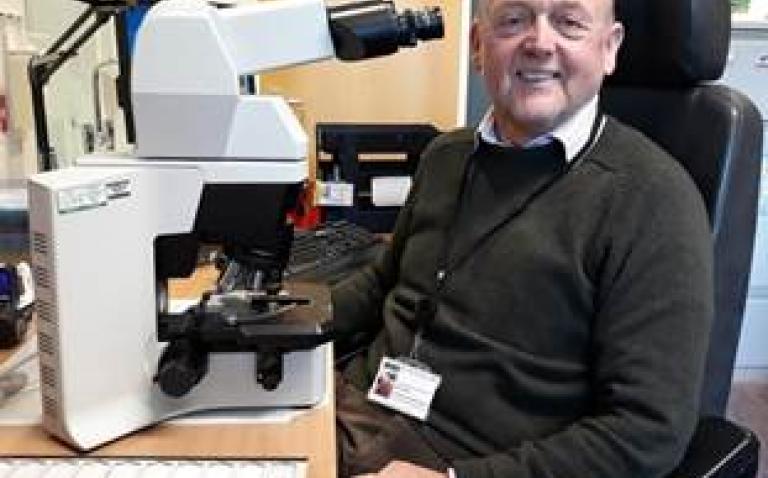A top consultant who has played a leading role in helping to develop nationally and internationally recognised services supporting the diagnosis and prevention of cervical cancer has been recognised by the International Academy of Cytology for his outstanding contribution to the field.
Dr John Smith, consultant gynaecological histopathologist and cytopathologist at Sheffield Teaching Hospitals NHS Foundation Trust, is only the third person from the UK to be given the Maurice Goldblatt Award, which is awarded by the International Academy of Cytology in recognition of professionals who have dedicated their lives to cytology.
The Awards are the highest bestowed on professionals working in the field, and have been given every year since 1961. Recipients have been 53 cytologists from 21 countries. The last UK doctor to receive the honour was in 1982.
He has held a number of influential positions, serving as president of the British Society for Clinical Cytology and vice-president of the International Academy of Cytology, and organiser of the highly successful 17th International Congress of Cytology in Edinburgh in 2010, which advanced knowledge and understanding by bringing together over 1000 scientists and clinicians from all over the world practising in cytology.
Dr Smith first started working at the Northern General Hospital in 1987, taking on a consultant role that involved examination of cervical smear tests to detect and prevent cancer of the cervix.
Using his scientific and diagnostic expertise, he became instrumental in helping to develop new and emerging practice that would eventually form the backbone of the now highly successful national cervical cancer screening programmes.
The specialist cervical screening cytology laboratory at the Royal Hallamshire Hospital, where he now works, was one of the first in the country to begin using liquid-based cytology. This technique – which at the time represented the first major change in the way cervical samples were prepared for examination in 50 years – involves processing cervical smear samples to produce a thin layer of cells on a slide to detect pre-cancerous changes rather than smearing them on a glass slide. Subsequently, from 2008, Sheffield Teaching Hospitals was one of six sites in England to pilot testing for human papillomavirus (HPV) – which is the known cause of cervical cancer – to further refine and improve the screening programme.
As Director of the North of England Pathology and Screening Education Centre (formerly the East Pennine Cytology Training Centre, which he founded in 1992), Dr Smith has played a pivotal role in evaluating cervical cancer screening practice and educated generations of trainee pathologists and laboratory scientists working in the NHS cervical screening programme.
Dr John Smith, consultant gynaecological histopathologist and cytopathologist at Sheffield Teaching Hospitals NHS Foundation Trust, said: “It is a great honour to receive this award. Cervical cytology is a highly specialist field, and I’ve been privileged to work with a fantastic team in Sheffield at the forefront of helping to develop the NHS cervical cancer screening programmes. I’m also proud to have been able to support the work of generations of pathologists across the north of England and to have worked both nationally and internationally to advance best practice. I feel truly humbled to have played a role in advancing specialist cytology practice, which through the development of national screening programmes, has benefited millions of women by given them access to earlier diagnosis and treatment.”
Dr David Throssell, medical director at Sheffield Teaching Hospitals NHS Foundation Trust, said: “I am so pleased that John’s talent and dedication to the NHS have been recognised. This is a thoroughly deserved, once-in-a lifetime award which acknowledges the significant contribution John has made to the practice of cytology over the last 30 years. His invaluable work has helped many patients living in Sheffield and the surrounding regions and further afield.”
Dr Smith will receive his award at the 20th International Congress of Cytology in Sydney on 5 May. He will receive a gold medal, diploma and deliver a scientific presentation to an audience of international experts. As the Congress is held on a three-yearly basis, Dr Smith will be presented with the 2017 Maurice Goldblatt Award.










